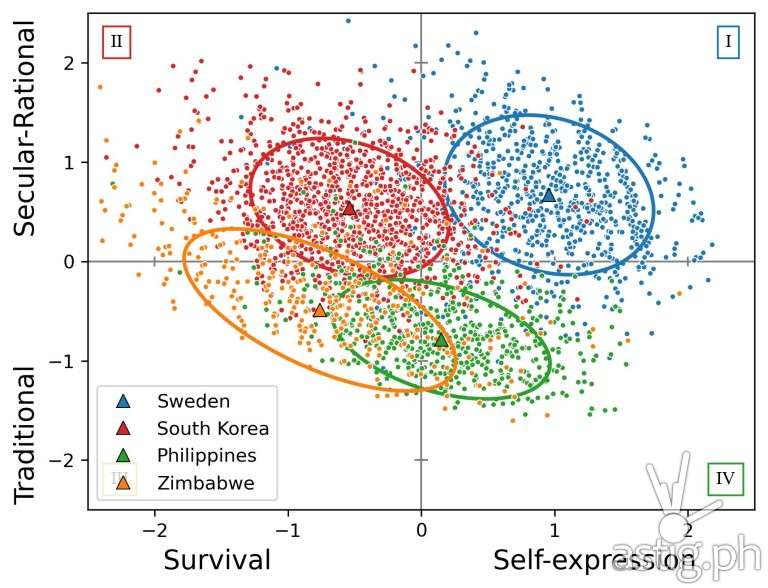MANILA, Philippines (Jun 2025) – Filipino physicists have created the world’s first time-resolved culture maps, revealing how global values have shifted over four decades and showing that the Philippines shares more cultural similarities with Latin American countries than its Asian neighbors.
The groundbreaking study by University of the Philippines Diliman scientists used data from over 300,000 survey respondents across 120 countries between 1981 and 2022 to track cultural evolution through mathematical modeling.
Using principal component analysis, physicists John Lawrence Euste, Hannah Christina Arjonillo, and Dr. Caesar Saloma transformed survey responses into visual maps that show both differences between countries and cultural diversity within individual nations.
“From our perspective as applied physicists, we wanted to detect and measure how culture has evolved, which is usually only described anecdotally,” said Dr. Saloma, explaining their work in sociophysics, which applies physics methods to social phenomena.
The research reveals that countries worldwide have generally moved toward greater emphasis on self-expression values over the past 40 years. Nations with less cultural diversity tend to maintain traditional values, while more diverse societies lean toward self-expression.
For the Philippines specifically, the data shows the country maintains strong traditional values centered on religion, family ties, and respect for authority, while simultaneously embracing self-expression through environmental protection and gender equality support.
Between 1996 and 2019, the Philippines showed slight movement away from traditional values and toward self-expression, according to the study published in Physica A: Statistical Mechanics and its Applications.
Perhaps most surprising, the research found that the Philippines shares closest cultural alignment with Latin American nations including Bolivia, Guatemala, Mexico, and Nicaragua, rather than neighboring Asian countries.
Researchers attribute this unexpected finding to over 300 years of Spanish colonial influence, which apparently left deeper cultural imprints than geographic proximity to other Southeast Asian nations.
The team developed two complementary mapping systems. The first represents entire countries as single points to compare national cultures, while the second shows individual respondents within countries to measure internal cultural diversity.
“The Philippines isn’t culturally homogeneous; it doesn’t make sense to represent the whole country with just one cultural profile,” Euste explained, describing why they created the dual-mapping approach.
Countries with smaller areas of cultural variation exhibited less diversity and upheld more traditional values, while those with larger variation areas showed greater diversity and stronger self-expression tendencies.
The physicists believe their methodology could help policymakers craft more effective legislation by understanding how cultural values evolve over time.
“Policies work best when they rely on scientific data and findings; it’s why quantifying cultural evolution matters,” Dr. Saloma said, noting that evidence-based governance produces better outcomes than anecdotal approaches.
The research team emphasized their work remains ongoing, with plans to expand their cultural measurement tools beyond physics applications.
“What’s important for us is to create tools for measurement, that’s the point of instrumentation,” Arjonillo said. “This is what we hope to evaluate and continue making progress on, not just in physics, but wherever we can find useful data.”
The study represents the first time scientists have successfully quantified cultural change using real-world empirical data rather than theoretical models, opening new possibilities for understanding social evolution through scientific measurement.
Policymakers and researchers interested in accessing these cultural mapping tools can contact the UP Diliman team to explore applications for governance and social planning initiatives.


